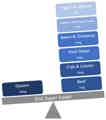Zinc is an Essential Nutrient for Metabolism and Immune Support
Zinc is the second most abundant mineral in your body after iron. It is mostly stored in muscles, bones, prostate, and the liver - but is found in almost all body tissues.
Zinc aids in enzyme function to control DNA expression, vitamin A metabolism, cell membrane stability, and your senses of smell and taste, among other things. The recommended daily allowance is 11mg for men and 8mg for women - or 11mg if pregnant or lactating. The maximum tolerable intake is 40mg daily (1).

Zinc Vitamin Absorption

How are Zinc, Copper, and Iron related?
Natural Function of Zinc in the Body
Zinc is ubiquitously utilized by enzymes throughout the body. It has a catalytic role in aiding enzymes to appropriately fold proteins, which is essential for correct protein function.
Zinc also plays a structural role in cellular and nuclear receptors that respond to estrogen, thyroid hormones, and fat soluble vitamins like D and A. Zinc also is a cofactor for transcription factors which control which genes are expressed.
Collagen synthesis and wound repair mandate zinc as a cofactor for transcription factors and enzymes (tiny machines) called metalloproteinases to promote auto-debridement and migration of the cells called keratinocytes, which form a water-tight protective barrier in injured skin. In bacterial or other infections, zinc acts as an anti-oxidant via metallothioneins to buffer reactive oxygen species and bacterial toxins (4).
Zinc plays a role in the maturation and function of almost all immune cells like neutrophils, macrophages natural killer T cells, and other T and B cells. Macrophages are cells that consume pathogens, they can use a high concentration of zinc intracellularly to kill pathogens they phagocytose.
The Role of Zinc in Disease Prevention and Treatment
Zinc For The Immune System
Zinc has been promoted to expedite recovery from the common cold – a main mechanism being competitive inhibition of ICAM-1, the molecule that rhinovirus uses to attack your nose.
Some studies have shown that taking at least 75mg/day of zinc in the form of lozenges or cough syrups can reduce cold symptoms by up to 33%.
While Zinc alone can be effective in boosting your immune system, it's most effective when coupled with diet and exercise.
Does Zinc Make You Nauseous
Although 75mg/day is a large dose, the use of zinc at a level of up to 180mg/day for two weeks has been shown to be safe. In other words, the adverse effects of zinc toxicity can be avoided at this level, suggesting that short-term, high-intake of zinc can be highly beneficial.
If you begin to over-supplement zinc to a dangerous degree, nausea will likely be your first warning sign to decrease or stop zinc therapy.
Zinc Deficiency
Zinc Deficiency Nails
Zinc plays many roles in the human body, including promoting healthy growth of nails and hair. If you're experiencing brittle nails, or reduced nail growth, zinc supplementation can potentially improve nail growth, or nail health.
Again, Zinc alone may not be the answer to nail health. A balanced diet is the first place to focus on when trying to have more healthy nails.
Does Zinc Cause Constipation
In the majority of people, zinc supplementation should not cause constipation. Much like being nauseous, the majority of people that use zinc supplements will not experience stomach pain or nausea.
That being said, if you are experiencing constipation or nausea, you may want to reduce or eliminate your zinc supplementation. Talk to your doctor if you have concerns sypmtoms that you believe may be related to your zinc consumption.
Zinc Toxicity
Zinc and Men's Health
We know that zinc is important in immune function elsewhere in the body, it is also important in fighting bacteria that are nearby or enter the male reproductive tract, being able to neutralize notoriously difficult pathogens such as spore-forming and gram negative bacteria.
FSH and LH are hormones made by the anterior pituitary gland in the brain which stimulate cells in the testicles, both hormones require zinc for synthesis. Their receptors in the testes rely on zinc to transmit their signal.
FSH stimulates Sertoli cells leading to sperm maturation. LH stimulates Leydig cells to synthesize and secrete testosterone.
5α-Reductase, the enzyme that intracellularly transforms testosterone into its most active form, dihydrotestosterone, requires zinc as a cofactor. Without adequate zinc, your body with neither produce adequate testosterone nor be able to utilize it to it’s fullest capacity (9).
Men who are zinc deficient and supplement with zinc can expect significantly increase their serum testosterone, a couple studies have shown almost a doubling in testosterone production. In these cases, it may be beneficial to supplement with 20mg daily instead of the generally recommended 11mg daily. Be careful not to exceed 40mg daily total zinc intake for longer than 2 weeks to avoid the zinc toxicities outlined above.
1. https://ods.od.nih.gov/factsheets/Zinc-HealthProfessional/
2. https://www.ncbi.nlm.nih.gov/pmc/articles/PMC7146416/
3. https://www.mdpi.com/2072-6643/12/3/762/htm
4. https://www.ncbi.nlm.nih.gov/books/NBK547698/
5. https://www.ncbi.nlm.nih.gov/books/NBK554548/
6. https://www.ncbi.nlm.nih.gov/books/NBK493231/
7. https://pubmed.ncbi.nlm.nih.gov/8875519/
The Vitaliboost Health Guide
